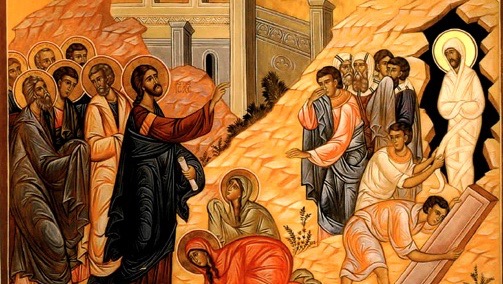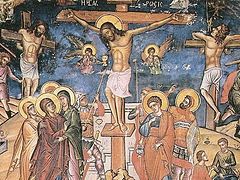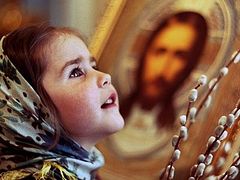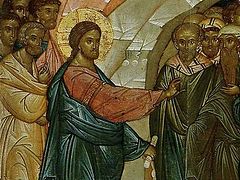Source: Orthodox Christian Network
April 28, 2016

By the grace of God, we have completed the Fast, and have now set our foot on the bridge leading from Great Lent to Holy Week.
Holy Week is called “Holy and Great Week,” or simply “Great Week” (Μεγάλη Ἑβδομάς), and is “great,” in the words of St. John Chrysostom, because “great and ineffable mysteries take place during this week.”
This is a time when the whole Church gathers together, when the whole Church celebrates the passion and resurrection of the Lord – and the overture, as it were, the prologue to the week, consists of two feasts: the Raising of Lazarus and Palm Sunday.
These two feasts, like all the feasts of the Church, do not have the primary purpose of recalling a historical event from the past, instead they have a deeper spiritual aspect.
These are also days of great grace – but to what extent we experience this grace is up to us – it depends on the degree of our preparation, one how much we prayed, how much we fasted, how much we struggled, how much we loved, so that we might hear what God is saying within us
The raising of Lazarus points to the Church’s faith in the general resurrection of all people – την κοινήν ανάστασιν προ του σου πάθους πιστούμενος – and if there is no resurrection of the dead, as St. Paul says, if Christ has not been raised, then our faith is in vain (1 Cor 15:14).
It is hope in the resurrection that enables us to live, that enables us to endure the trials that life brings us – otherwise our life is tragic and futile, because all our works, efforts, and accomplishments will be destroyed by death, swept away by time, as if we had never existed at all.
We have lost the sense of a life lived in the hope and expectation and experience of the resurrection – we’ve limited ourselves to worldly things; we don’t live in the light and perspective of the resurrection.
Most of us are just as troubled, stressed, confused and as lost as everyone else in society, and so people look at us and say, “Christians are no different than we are, why should we become Christian, or believe in Christ?”
To the contrary, St Silouan once said: “Christ, don’t give me more joy, or else my heart will break!” But what do we say? “Christ, don’t give me any more stress, problems, or difficulties, or else my heart will break!” Do you see the difference?
We’ve been going to church for so many years – but do we have this joy within us? If not, we need to seek out the reasons, the causes, and we will discover, as St Maximos the Confessor says, that the cause is that our bond with Christ, our connection with him, is weak.
But even when we are dead, in the very midst of our darkness and death, Christ comes to us, just as He came to the grave of Lazarus. When you hear that He raised Lazarus, and when you hear that He descended into hell to free the souls that were there, don’t think that this is something that happened only a long time ago.
The heart is a tomb, and deep within it are buried our thoughts, and our mind – our intellect, the core of who we are – is buried and imprisoned in heavy darkness. And so Christ comes to those souls who call upon him, who cry out to him, and He descends into the depths of their heart – He removes the heavy stone, the weight that oppresses the soul; He opens the tomb and resurrects us, for we were truly dead, and He leads us out of the darkness and into His own light.
Let us not be like that disciple who did not believe in the resurrection, which means he did not believe in the possibility of his own resurrection, of the resurrection of virtue and knowledge and new life within himself. His name means “double,” for he was double-minded, which means he doubted, and what he doubted was the resurrection of Christ within his heart.
Let us live in the joy and the blessing of the presence of God – the joy of the resurrection, the joy of Pascha – none of us should miss this! – We can’t let Bright Monday be just another day, when we go back to talking about … the weather, because all the other joys in life fade in comparison to the joy of the resurrection; all the other joys will fade, grow old, break into pieces, slip through our fingers, and leave us alone and empty – but not this one – just as Christ said: “Now you have sorrow, but I will see you again, and your heart will rejoice, and no one will take your joy from you” (John 16:22).
This is the joy of Pascha!




